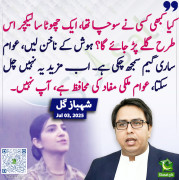@ Abdu Tawwab, Biomat, Rana, Baba Deena and Others
First of all I have to end this speculation that I was born and raised as a Salafi follower by my parents in Kuwait and therefore I have no connections with Ahlul Quran and Shia sects. Secondly Ive never acquired a slavish mentality that if Ive connected with one sect then I have to agree and accept its all rulings without giving due attention to my assessing faculties of logical reasoning. As a logical reasoning person I only accept those matters and arguments which can stand upon the foundations of clear cut reasoning and analogy.
Now dear Abdu Tawwab the link which youve given to me in your post of
http://www.sunnidefence.com was nothing but a pile of accusations on the alleged deceptions and treachery of our Shia brothers. It does not contain the rebuttal and accusations (According to you) of answeringansar.com website. You and many other respectable guys are keep on retorting the same on rhetoric that the word Istimtatum in Chapter 4 Ayaa 24 does not mean Temporary Marriage but the enjoyment of sexual relations with that Zawj (Spouse). Whereas the Arabic lexicographers agree unanimously that this word IstimTatum is the Verbal form of this word Mutaah.
It is to be noticed that the same word appears in the second most authentic book of our (Sunnis, to whom Im also the member of) Hadith literature in Imam Muslims Sahih in these following wordings;
"Sabra al-Juhanni reported on the authority of his father that while he was with Allah's Messenger (may peace be upon hm) he said: 0 people, I had permitted you to contract temporary marriage with women"
Sahih Muslim, Book 08, Hadith Number 3255.
Now the Muwatta of Imam Malik one of the four major jurist of our madhab contains this Hadith in his monumental book, which is been considered by many scholars and researchers of Islam as the most authentic book of Hadith in terms of its authenticity. Here it is to be noted that the reason why Muwatta of Imam Malik is not considered at par with Bukhari and Muslim is because not of its weak traditions but because primarily Imam Malik compiled that book for the purposes of discussing the legal issues in Islam and henceforth it is not mentioned a hardcore Hadith manual but a legal corpus;
Yahya related to me from Malik from Ibn Shihab from Urwa ibn az-Zubayr that Khawla ibn Hakim came to Umar ibn al-Khattab and said, ''Rabia ibn Umayya made a temporary marriage with a woman and she"
Muwatta of Imam Malik, Book 28, Hadith Number 28.18.42
Ibn Kathir, Imams Tabari and Qurtubi (All of them belong to the Ahlal Sunnah Jamaa) have mentioned in their works that the 4:24 Ayaa of Holy Quran is dealing with the issue of Mutaah (Temporary) marriage. If someone happens found different versions of what Ive mentioned here then he or she can lay the proof here and InshAllah I have the open heart and mind to scrutinize those evidences with open heart and mind. As Ive mentioned earlier the best way to deal in epistemological and logical matters is to deal all the queries and arguments with an open mind and try to examine them with the tools of rational mind and intellect not to just saying Huh thats an institutionalized prostitution and license for moral disintegration and deviation. To those who are producing these baseless rants I DARE THEM TO LAY THE PROOFS AND EVIDENCES WHICH CAN STAND THE TEST OF SOUND REASONING AND PROPER AUTHENTIC SOURCES WHICH CONTRADICTS OR ABROGATES THE MENTIONED AYAA OF HOLY QURAN.
And lastly for those who think that the word Istimtatum means the physical consummation (Physical sexual relations) of that marriage then the following Allama Tabatbai has this to mention here;
If the meaning of the verse is tamt'atum [meaning physical enjoyment in this case], then this does not fit with the part of this verse which follows, i.e. "Give them their compensation." This is because the dowry (mahr!) is obligatory (wajib) by the simple establishment of the marital contract (aqd), and it does not rely upon the actual act of physical enjoyment...Rather, one half is made wajib by the contract, and the other half is made wajib by sexual penetration (dukhul). Furthermore, the ayat which was revealed before is sufficient in making clear the dowry has to be paid under all circumstance, and so there is no point in repeating. This is the verse [4:4] that says: "And give the women their dowries as a gift," as well as the verse "There is no sin upon you if you divorce your wives before you have touched them or specified a dowry. But give them a gift of compensation, the wealthy what he can, and the poor what he can" until He says: "And if you divorce them before you have touched them, and you have decided upon a dowry, then give them half of what you have agreed upon."
Allama Tabatabai, Al-Mizan, Vol.4, Page.280
Now lets look at the root word of Istimtatum, M-T- ; So that many of us in this forum would not become confused of its meaning.
"Verbal form: to carry away, take away; to be strong, firm, soldTo make enjoy; to furnish, equip supply; to give as a compensationto gratify the eye; to make enjoy, to have the usufruct; to be blessed and to enjoy, savour, relish"
Noun form: enjoyment, pleasure, delight, gratification; recreation; compensation paid to a divorced woman; Muta'h, temporary marriage, usufruct marriage contracted for a specified time".
Again the Ayatullah Maghniya in his Fiqh of Imam Jafar Al-Sadiq (Yes the same Imam who taught the forefather of the great Hanafi Madhab Imam Abu Hanifa and also a close friend and contemporary of Imam Malik) has this to say on the meanings of Mutaah;
Mut'ah has many meanings. In some cases it may mean to take benefit, such as when Allah (swt) refers to "They take the benefits of the worldly life." It may refer to increase, or it may refer to remaining, such as when He says: "He let them remain for a while." It may also refer to a gift, such as when He, Blessed be His Names, says: "They are gifted of knowledge." As far as the legal scholars, they talk about Mut'ah in the meaning of a gift, in the sense of what they make obligatory on a man who has married a woman without specifying a dowry, and then divorces her before having sexual relations. They would necessitate that the divorced woman be a gift that is appropriate for his economic status. This is based upon the ayat 236 of Surah al-Baqara: "There is no sin on you that you divorce women whom who you have not touched, and that you give them a gift (Mut'ah), the rich man based on his ability, and the poor based on his ability, a righteous gift which is a right over the pure ones." They also talk about Mut'ah in terms of hajj, which we have discussed elsewhere. Alongside of these uses, the scholars of law talk about Mut'ah in terms of a fixed-time marriage. There is universal consensus amongst Sunni and Shi'a scholars that Islam has legislated this, and that the Prophet (s) made this permissible. This is based upon ayat 24 of Surat an-Nisa': "When you have done Mut'ah with them, so give them the agreed upon dowry."
Bret Hawk
































